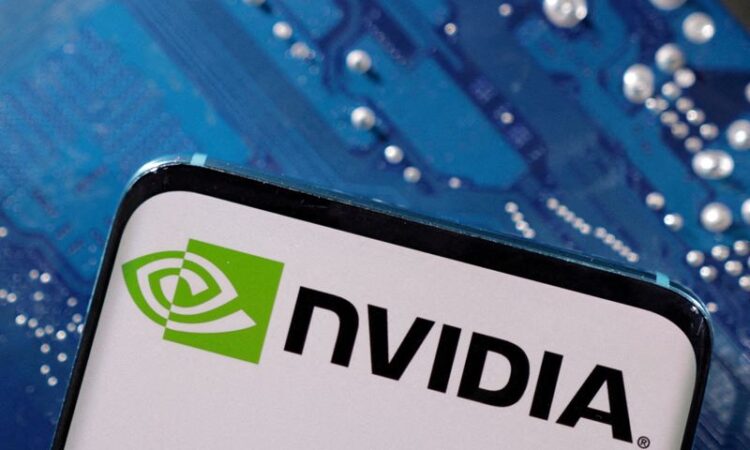
By Noel Randewich
(Reuters) – Increased analysts’ estimates since Nvidia’s strong quarterly report last week have left the world’s most valuable chipmaker trading at its lowest forward earnings multiple in eight months.
Nvidia’s stock added nearly 2% to $468 on Monday, leaving it down almost 1% since last Wednesday, when the Santa Clara, California company far exceeded expectations with its quarterly revenue forecast as an artificial-intelligence boom fueled demand for its chips.
At that price, Nvidia shares are trading at the equivalent of around 33 times expected earnings over the next 12 months, according to Refinitiv data. That forward PE compares to over 46 a week ago, and it is now at its lowest since December 2022.
Nvidia’s stock has more than tripled this year amid soaring demand for its top-of-the-line processors used to power generative AI technologies that can read and write in human-like ways.
Price/earnings ratios help investors gauge the value of companies, but relying on analysts’ estimates of future earnings creates uncertainty.
“Any time you use a forward-looking thing that involves an estimate in a very new market and very uncertain economic environment, I think at a minimum you have to take it with a pretty huge grain of salt,” warned Ross Mayfield, an investment strategy analyst at Baird.
Benchmark Research analyst Cody Acree has a “buy” rating on Nvidia but pointed to the company’s reliance on Taiwanese chip foundry TSMC, which also serves Apple and other big customers, as a factor that could keep Nvidia from selling as many of its high-end chips as it would like.
“It’s not just demand, but what they can actually deliver,” Acree said.
In its report last week, Nvidia, with a stock market value of $1.14 trillion, also said it would buy back $25 billion of its shares, suggesting chief executive Jensen Huang views them as undervalued, even after gaining 220% year to date.
Following its report, analysts on average expect Nvidia’s revenue for the fiscal year ending in January 2024 to reach $53 billion, nearly double the previous year, according to Refinitiv data. The company’s net income is seen quintupling to over $22 billion in the same fiscal year before reaching $35 billion the following year.
(Reporting by Noel Randewich; editing by Diane Craft)





